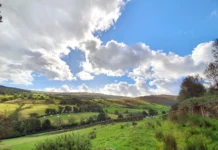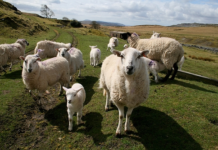New research which estimates that around £800m could be lost from the southwest of England as a result of Defra’s reforms of English agricultural support confirm concerns raised by the Farmers’ Union of Wales in response to government consultations in both England and Wales, says the union.
The ‘Assessing the impact of Agricultural Transition in Cornwall & the Isles of Scilly, Devon, Dorset and Somerset’ final report by the University of Gloucester’s Countryside and Community Research Institute (CCRI), which was commissioned by the Great South West partnership, looked at the impacts and opportunities of the current English ‘Agricultural Transition’ policy on farmers, land managers and the wider rural community.
“The research found that over the English transition period a total of £884 million in direct agricultural support will be lost by farmers in the area by the end of 2027, with replacement scheme funding making up only a fraction of this loss even in best case scenarios,” said FUW President Glyn Roberts.
“The research also highlights a wider impact across the rural economy ‘like the ripples in the water when a stone hits’, precisely echoing what we have consistently warned of, including in our responses to consultations on proposals conducted in England and Wales.”
In its response to Defra’s February 2018 ‘Health and Harmony’ proposals for agricultural reforms, the FUW stated that:
‘…little more than lip-service has been paid to the wellbeing of individuals, farming families, rural businesses and the rural and wider economy, as well as others involved in agricultural and food supply chains…we oppose any intermediate or long term plans to reduce direct payments to zero in the absence of the introduction of properly investigated policies which will mitigate the otherwise severe consequences of abandoning direct support for family farms and rural businesses.’
The CCRI report states that:
‘The many potential knock-on effects for rural economies and communities are hard to estimate with precision…assuming that 25-50% of the £883M of BPS that is lost was previously spent on businesses supporting the farming sector the loss represents a hit of £220-440M lost in the next 5 years for feed merchants, machinery retailers, contractors, vets, solicitors and many others. This too will reduce their own spending power in the rural economy and so the impact of the agricultural transition goes on.’
Mr Roberts said that despite having consulted in 2018 on proposals that were very similar to those now being implemented in England, the Welsh Government had revised their timetable and proposals in response to strong lobbying and warnings by the FUW and others.
“However, it is essential that the Welsh Government consider the evidence provided in this important piece of work and ensure that its Sustainable Farming Scheme does not have the same devastating impacts that are already beginning to be felt in England,” he said.
Mr Roberts also stated that he had grave concerns about the impact of the English transition on the FUW’s cross-border members who farm land in both England and Wales, and called on Defra to urgently revise its policies in order to protect English and cross-border rural communities.
“The impacts of the English agricultural transitions, coupled with the UK Government’s appetite for liberal trade deals with agricultural producers on the other side of the globe, gives the distinct impression that there is a deliberate agenda to undermine family farms and rural areas and displace UK food production.
As we warned in our response to Defra in 2018, great care should be taken to ensure rural communities are not left in a worse state than they have been since the agricultural depressions of the 19th and 20th Centuries,” he added.

| [donate]
| Help keep news FREE for our readersSupporting your local community newspaper/online news outlet is crucial now more than ever. If you believe in independent journalism,then consider making a valuable contribution by making a one-time or monthly donation. We operate in rural areas where providing unbiased news can be challenging. |



















